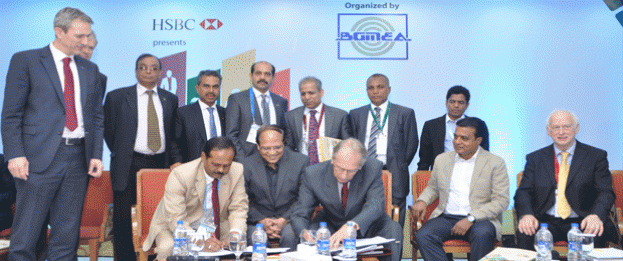


December 08, 2014
Environmental Sustainability A must
(Dhaka,7 December 2014) Dhaka Apparel Summit, 1st of its kind in Bangladesh, is being held at the Bangabandhu International Conference Center 7-9 December 2014. The summit was organized by Bangladesh Garment Manufacturers and Exporters Association (BGMEA) in collaboration with Brand Forum Bangladesh.
Press Release: Session-3
The 3rd session of the Dhaka Apparel Summit titled “Environmental Sustainability- A must” was held at Bangabandhu International Conference Center (BICC) in Dhaka M on 7 December.
This session discussed how the RMG sector can meet the imperatives of environmentally sustainable economic growth in a densely populated country. The session also covered resource efficiency and its social, financial, and economic benefits, environmental health and safety, global agenda on environment, and impact on buying patterns. Emerging leadership and initiatives on environment were also highlighted in the session.
Opinions:
Dr. Atiur Rahman, Governor, Bangladesh Bank, the central bank of Bangladesh is the only central bank that has a green banking department. Many garment factories are having access to green fund.
“We need to reorganize the campaign to go green. We have green fund to give loan at low rate for those factories which want to go green”, Dr. Atiur Rahman added.
“If inflation comes down, the rate of interest of banks will also come down. The garment entrepreneurs can use foreign loan and export promotion loan at lower interest rate”, the BB Governor suggested.
“The RMG industry is the lifeline of Bangladesh’s economy. So I will always stand by the industry”, Dr Atiur said.
Gerben De Jong, Ambassador, Embassy of the Kingdom of Netherlands to Bangladesh, said: “ In 2009 the IFC conducted a small pilot project titled Cleaner Production (CP) with a few number of factories which succeed in cost reduction, thus got popularity among the business people, which inspired them to upscale the project namely Partnership for Cleaner Textile (PaCT).”
John T Smith, Long Term Adviser, Better Work in Textiles and Garments of UNIDO said that many garment factories of Bangladesh are going green and also a good number of green factories are being established. “So I believe that Bangladesh will lead the world in this area in the coming years”, he added.
K.M. Rezaul Hasanat, Chairman & CEO, Viyellatex Group, said that as per Kyoto Protocol 6 metric ton per capita carbon emission is permitted. Whereas, Bangladesh has been emitting only 0.3 metric ton per capita carbon. So, sourcing from Bangladesh means saving environment, Mr David opined.
Lars Doemer, Global Sustainability Manager, Lindex, said that creating awareness should be first priority for Bangladesh at this stage. “Existing achievements of Bangladesh in terms of good environmental practices also need to be communicated to the world at the same time”, he added.
Bastiaan Mohrmann, Head of Water Advisory, South Asia, (IFC), and Co-Lead, Asia and Middle East, for the 2030 Water Resources Group, moderated the session.
Dr. Atiur Rahman, Governor, Bangladesh Bank, Gerben De Jong, Ambassador, Embassy of the Kingdom of Netherlands to Bangladesh, M. Rezaul Hasanat, Chairman & CEO, Viyellatex Group, and Elke Shrestha, Senior Advisor, Environmental Standards and Resource Efficiency, PSES, GIZ, and Lars Doemer, Global Sustainability Manager, Lindex, and John T Smith, Long Term Adviser, Better Work in Textiles and Garments of UNIDO took part in the session as panel speakers.

Copyright © 2020, The Bangladesh Garment Manufacturers and Exporters Association.
Version-2.0, Design & Developed by Systech Digital Limited.
Version-2.0, Design & Developed by Systech Digital Limited.
